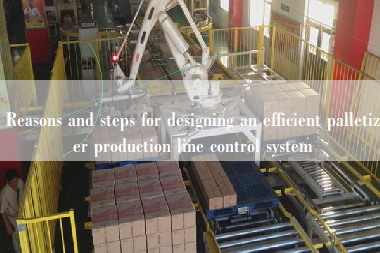The palletizer production line control system is an important part of modern industrial automated production lines. Its main role is to control and monitor the production process and improve production efficiency and quality. This article will introduce the design reasons and steps for the palletizer production line control system, and help readers understand how to design an efficient palletizer production line control system.
1. Design reasons
1. improve production efficiency

The palletizer production line control system can automate the production process, reduce manual intervention and improve production efficiency. By monitoring and controlling the production process, errors and waste in the production process can be reduced and production efficiency and quality can be improved.
2. reduce costs
The palletizer production line control system can reduce manual intervention and reduce labor costs. At the same time, by optimizing and controlling the production process, waste and losses in the production process can be reduced and production costs can be reduced.
3. improve product quality
The palletizer production line control system can accurately control the production process, avoid mistakes and waste in the production process, and improve product quality. At the same time, through monitoring and controlling the production process, problems in the production process can be discovered and dealt with in a timely manner to ensure product quality.
2. Design steps
1. demand analysis
Before designing a palletizer production line control system, a requirements analysis is first needed. The demand analysis includes the analysis of the production process and the demand analysis of the palletizer production line control system. Through demand analysis, the functional and performance requirements of the palletizer production line control system can be determined.
2. system design
Carry out system design based on demand analysis. System design includes designing the structure and functions of the system, determining the hardware and software composition of the system, and determining the communication protocol and data transmission method of the system.
3. system implementation
After the system design is completed, the system is implemented. System implementation includes developing and debugging the system’s hardware and software, as well as testing and debugging the system’s communication protocols and data transmission methods.
4. system test
After the system implementation is completed, system testing is carried out. System testing includes testing the function and performance of the system, as well as testing the stability and reliability of the system. Through system testing, problems existing in the system can be discovered and solved to ensure the normal operation of the system.
5. system maintenance
After the system test is completed, system maintenance is carried out. System maintenance includes maintaining and updating the system’s hardware and software, as well as optimizing and improving the system’s communication protocols and data transmission methods. Through system maintenance, long-term stable operation of the system can be ensured.
3. Summary
Designing an efficient palletizer production line control system requires steps such as requirements analysis, system design, system implementation, system testing and system maintenance. By controlling and monitoring the production process, production efficiency and quality can be improved and production costs can be reduced. At the same time, attention needs to be paid to the stability and reliability of the system to ensure long-term stable operation of the system.
